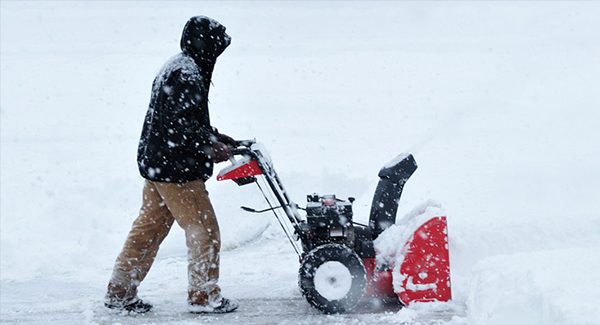As Chicago moves into the winter months, landlords and property managers are faced with the challenge of ice and snow removal.
This article will provide an overview of the Chicago Snow Removal law and how it affects apartments buildings, condominium buildings, rental properties, and businesses.
What is the Chicago Snow Removal law?
Section 10-8-180 of the Municipal Code of Chicago states:
“Every owner, lessee, tenant, occupant or other person having charge of any building or lot of ground in the city abutting upon any public way or public place shall remove the snow and ice from the sidewalk in front of such building or lot of ground. If the sidewalk is of greater width than five feet, it shall not be necessary for such person to remove snow and ice from the same for a space wider than five feet. In case the snow and ice on the sidewalk shall be frozen so hard that it cannot be removed without injury to the pavement, the person having charge of any building or lot of ground as aforesaid shall, within the time specified, cause the sidewalk abutting on the said premises to be strewn with ashes, sand, sawdust, or some similar suitable material, and shall, as soon thereafter as the weather shall permit, thoroughly clean said sidewalk. The snow which falls or accumulates during the day (excepting Sundays) before four p.m. shall be removed within three hours after the same has fallen or accumulated. The snow which falls or accumulates on Sunday or after four p.m. and during the night on other days shall be removed before ten a.m.”
In summary, this law details:
- who must remove snow and ice from sidewalks
- the time frame for snow and ice removal
- legal repercussions if the law is not followed
Who is responsible for removing the snow and ice?
It depends on who has “charge of the building.” If you are a Chicago property owner, landlord, or property manager of a rental building, you are very likely the responsible party for the removal of the snow and ice on the sidewalks.
Additionally, section 10-8-190 of the Municipal Code of Chicago clarifies liability for civil damages:
“Any person, who removes snow or ice from the public sidewalk or street, shall not, as a result of his acts or omissions in such removal, be liable for civil damages. This section does not apply to acts or omissions amounting to willful or wanton misconduct in such snow or ice removal.”
When do I have to clear the sidewalks?
- Sidewalks need to be cleared seven days a week
- If the snow falls between 7 a.m. and 7 p.m., sidewalks must be cleared by 10 p.m.
- If the snow falls between 7 p.m. and 7 a.m., sidewalks must be cleared by 10 a.m.
What are the expectations for snow removal?
- You must clear a five-foot wide path (this width allows pedestrians in wheelchairs, people with children in strollers, students walking to school, and individuals with assistive devices the ability to walk down the sidewalk)
- Salt or sand must be put down to help mitigate ice forming
- Do not push the snow into the street, bike paths, crosswalks, bus stops, or alley ways and do not bury any fire hydrants
- Ramps attached to your public sidewalk must be cleared
It’s also important to check building downspouts. They help direct water away from the building but should not be directed at the sidewalks. Freezing temperatures, particularly at night, can create hazardous slip and fall conditions from melting snow.
What happens if the sidewalks are not cleared of snow?
- Individuals can face fines up to $500 per day
- Businesses can face fines up to $1,000 per day
Lastly, if you are unable to clear the sidewalk in Chicago, you can request a Snow Corps Volunteer which is a program that connects volunteers with residents in need of snow removal (ie. seniors and residents with disabilities). To request this service, call 311.
If you are a landlord with legal concerns regarding the Chicago Snow Removal law, do not hesitate to contact our law firm by calling 855-537-0500 or visiting www.ksnlaw.com.
Since 1983, KSN has been a legal resource for condominium, homeowner, and townhome associations. Additionally, we represent clients in real estate transactions, collections, landlord/tenant issues, and property tax appeals. We represent thousands of clients and community associations throughout the US with offices in several states including Florida, Illinois, Indiana, and Wisconsin.
Please note the material contained in this article is for educational and informational purposes only and does not constitute legal advice. No attorney-client relationship is established by your review or receipt of the information contained in this article. You should not act on the information discussed in this article without first obtaining legal advice from an attorney duly licensed to practice law in your State. While KSN has made every effort to include up-to-date information in this article, the law can change quickly. Accordingly, please understand that information discussed in this article may not yet reflect the most recent legal developments. Material is not guaranteed to be correct, complete, or up to date. KSN reserves the right to revise or update the information and statements of law discussed in the article law at any time, without notice, and disclaims any liability for your use of information or statements of law discussed on the article, or the accessibility of the article generally. This article may be considered advertising in some jurisdictions under applicable law/s and/or ethical rules/regulations. © 2021 Kovitz Shifrin Nesbit, A Professional Corporation.

